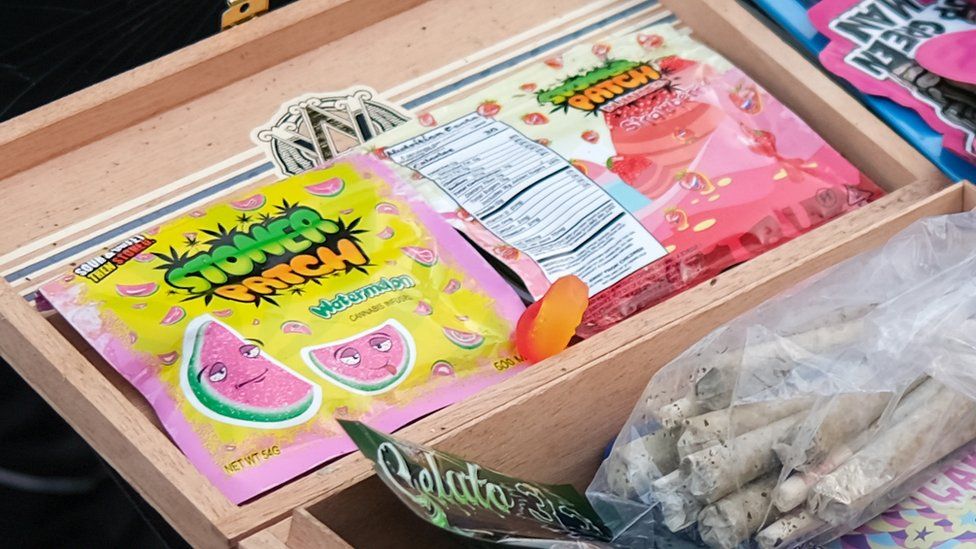ARTICLE AD BOX
 Image source, Getti Images: Alexi Rosenfeld
Image source, Getti Images: Alexi Rosenfeld
Cannabis edibles can appear in packaging that looks like regular candy
By Brandon Drenon
BBC News, Washington
The number of US children under the age of six who accidentally ate cannabis edibles has increased in the last five years, as restrictions have loosened across the country, according to a new study.
The study found an increase of 1375% of reported cases between 2017 and 2021.
Of a total 7043 "exposures" in five years, 573 cases resulted in children admitted to critical care units.
More than 97% of cases occurred at home.
The study, published on Tuesday in the journal Pediatrics, analysed data from the National Poison Data System, which keeps track of poison control centres in the US.
The goal of the study, according to Dr Marit Tweet, a medical toxicologist and one of its co-authors, was to raise awareness for what is becoming an increasingly problematic issue.
Cannabis edibles come in the form of candy, chocolates, cookies, and other sweets that often look like normal snacks, Dr Tweet said, and can appeal to children who are unaware of what's inside.
"If a child opens a pack of (cannabis-infused) gummy bears, they're not likely to stop at one. Kids enjoy candy," Dr Tweet said. "They may consume the whole package."
The most common reported clinical effect was central nervous system (CNS) depression, which includes drowsiness and lethargy. In about 36% of the cases, the children were treated and released. A small percentage of reported cases - less than 2% - developed more severe effects. Over 3,000 cases - 70% - had some degree of CNS depression.
Dr Tweet said her research could not conclude what is causing the increase in children being exposed to edibles - but she noted that the largest increase in reported cases of children unintentionally consuming edibles occurred during the pandemic.
She suggested, cautioning her theory was not backed by data, that more children at home for longer periods during the pandemic meant more opportunities for exposure.
The rise in cases has also occurred as marijuana restrictions have eased across the US.
The number of states with legalised recreational use has more than doubled, from eight to 18, in the last five years. And the number of states allowing medicinal cannabis use has increased from 30 to 39.
A similar phenomenon is occurring in Canada.
After legalising edibles in early 2020, accidental cannabis poisonings among children under 10 years old in Ontario, Alberta and British Columbia were more than double that of Quebec, which only allowed edibles last year in the form of dried fruits and vegetables.
Canada legalised the recreational use of cannabis nationwide in 2018, though provinces are able to set some of their own regulations.
While it doesn't appear that the legislative trend will change, Dr Tweet said states are trying to find ways to reduce potential harm to children.
In Dr Tweet's home state of Illinois, according to state law it is illegal for products containing marijuana to use "any image or design likely to appeal to minors" or for packaging to "bear any resemblance" to any commercially available candy.
Also, some US states are increasing the restrictions on the amount of THC - the psychoactive compound in marijuana - that can be included in edibles. This can reduce the risk of serious harm should a child accidentally eat a cannabis-infused product.
The challenge, Dr Tweet said, is that marijuana laws vary state to state.
On an individual basis, there are steps parents can take to mitigate the risk for their children.
Parents can store their products in high, hard-to-reach places, she said, or put them in restrictive packaging. They can keep the cannabis products away from food or out of the kitchen altogether. She also recommended parents avoid consuming edibles in front of their children.
"Treat (marijuana edibles) how they would other dangerous substances," Dr Tweet said. "That can help."

 2 years ago
45
2 years ago
45








 English (US) ·
English (US) ·